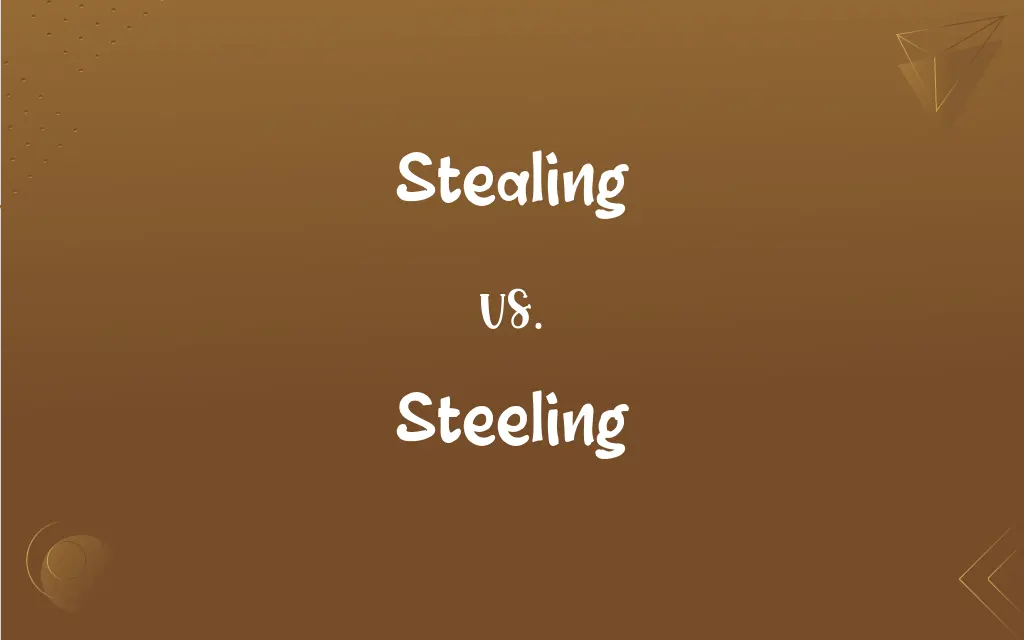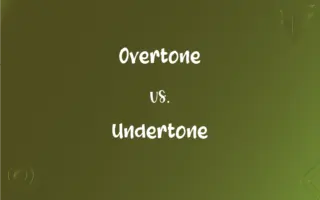Stealing vs. Steeling: What's the Difference?
By Harlon Moss || Updated on May 22, 2024
Stealing refers to taking someone else's property without permission, while steeling means mentally preparing oneself to face something difficult or unpleasant.

Key Differences
Stealing involves the act of taking someone else's property without their consent. It is considered a criminal activity and can lead to legal consequences. The term is commonly used in contexts related to theft, burglary, or embezzlement. Steeling, on the other hand, refers to mentally or emotionally preparing oneself for a challenging or unpleasant situation. This term is often used in the context of psychological readiness or fortification, implying the need for inner strength and resolve.
Stealing is an illegal and unethical act that involves dishonesty and deception. Individuals who steal are often motivated by financial gain, necessity, or even compulsion. The consequences of stealing can range from legal penalties to social stigma. Steeling oneself is a proactive measure taken to face adversity with courage and determination. It is a psychological process that helps individuals manage stress, fear, or anxiety. This term suggests a form of inner strengthening, akin to tempering metal to make it stronger.
In legal contexts, stealing is addressed through laws and regulations designed to protect property rights and maintain social order. Offenders can face fines, imprisonment, or other legal repercussions. Steeling, meanwhile, is a personal coping mechanism that can be essential for handling difficult life events or stressful situations.
Stealing disrupts trust and can have significant negative impacts on victims, leading to loss and emotional distress. In contrast, steeling can enhance personal resilience and improve one's ability to navigate challenging circumstances, contributing to personal growth and development.
Comparison Chart
Definition
Taking property without consent
Mentally preparing for difficulty
ADVERTISEMENT
Legality
Illegal
Legal
Context
Criminal activity
Psychological readiness
Motivation
Financial gain, necessity
Facing adversity with courage
Consequences
Legal penalties, social stigma
Increased resilience, emotional strength
Impact on Others
Loss, distress
Often personal, non-impactful to others
ADVERTISEMENT
Usage in Sentences
"He was caught stealing a bike."
"She was steeling herself for the exam."
Stealing and Steeling Definitions
Stealing
Engaging in theft or burglary.
Stealing from the store led to severe consequences.
Steeling
Building up mental resilience.
Steeling oneself before surgery can help manage fear.
Stealing
Taking someone else's property without permission.
The thief was arrested for stealing a wallet.
Steeling
Strengthening inner resolve.
Steeling her heart, she faced the harsh reality.
Stealing
Illegally acquiring goods or services.
He was found guilty of stealing cable service.
Steeling
Getting ready to face an unpleasant task.
He was steeling himself to deliver the bad news.
Stealing
Taking without the owner's knowledge.
She regretted stealing money from her friend's purse.
Steeling
Preparing oneself mentally for a tough situation.
He was steeling himself for the challenging interview.
Stealing
To take (the property of another) without right or permission.
Steeling
Fortifying one's emotions against anticipated difficulties.
She spent the evening steeling her nerves before the presentation.
Stealing
To present or use (someone else's words or ideas) as one's own.
Steeling
A generally hard, strong, durable, malleable alloy of iron and carbon, usually containing between 0.2 and 1.5 percent carbon, often with other constituents such as manganese, chromium, nickel, molybdenum, copper, tungsten, cobalt, or silicon, depending on the desired alloy properties, and widely used as a structural material.
Stealing
To get or take secretly or artfully
Steal a look at a diary.
Steal the puck from an opponent.
Steeling
Something, such as a sword, that is made of steel.
Stealing
To give or enjoy (a kiss) that is unexpected or unnoticed.
Steeling
A quality suggestive of this alloy, especially a hard, unflinching character.
Stealing
To draw attention unexpectedly in (an entertainment), especially by being the outstanding performer
The magician's assistant stole the show with her comic antics.
Steeling
Steel gray.
Stealing
(Baseball) To advance safely to (another base) during the delivery of a pitch, without the aid of a base hit, walk, passed ball, or wild pitch.
Steeling
Made with, relating to, or consisting of steel
Steel beams.
The steel industry.
A bicycle with a steel frame.
Stealing
To steal another's property.
Steeling
Very firm or strong
A steel grip.
Stealing
To move, happen, or elapse stealthily or unobtrusively
He stole away for a quiet moment. The deadline stole up on us.
Steeling
Of a steel gray.
Stealing
(Baseball) To steal a base.
Steeling
To cover, plate, edge, or point with steel.
Stealing
The act of stealing.
Steeling
To make hard, strong, or obdurate; strengthen
He steeled himself for disappointment.
Stealing
(Slang) A bargain.
Steeling
Present participle of steel
Stealing
(Baseball) A stolen base.
Steeling
A strengthening with, or as if with, steel.
Stealing
(Basketball) An act of gaining possession of the ball from an opponent.
Stealing
(uncountable) The action of the verb to steal, theft.
Stealing
That which is stolen; stolen property.
Stealing
Present participle of steal
Stealing
The act of taking feloniously the personal property of another without his consent and knowledge; theft; larceny.
Stealing
That which is stolen; stolen property; - chiefly used in the plural.
Stealing
The act of taking something from someone unlawfully;
The thieving is awful at Kennedy International
Stealing
Avoiding detection by moving carefully
Stealing
Committing an act of dishonesty for personal gain.
Stealing company secrets can result in a lawsuit.
FAQs
Is stealing always illegal?
Yes, stealing is illegal and considered a criminal act.
What does stealing mean?
Stealing means taking someone else's property without permission.
What are the consequences of stealing?
Consequences can include legal penalties, fines, and imprisonment.
Is stealing always premeditated?
Stealing can be both premeditated or impulsive, depending on the situation.
How can one steel themselves?
By mentally preparing, focusing on resilience, and practicing stress management techniques.
Can steeling be related to physical preparation?
Steeling generally refers to mental or emotional preparation rather than physical.
Does steeling require professional help?
Not necessarily, but professional help can be beneficial in particularly stressful situations.
Is steeling a commonly used term?
Steeling is less common but is used to describe mental preparation for difficult situations.
Is steeling a form of avoidance?
No, steeling is about facing challenges head-on with mental readiness.
What are some legal repercussions of stealing?
Legal repercussions can include arrest, trial, and sentencing to jail or fines.
Is steeling a positive action?
Yes, steeling oneself is a positive and proactive approach to managing stress and adversity.
What motivates someone to steal?
Motivations can include financial need, thrill-seeking, compulsion, or opportunism.
Are there different types of stealing?
Yes, types include petty theft, grand theft, burglary, embezzlement, and shoplifting.
Can stealing be justified?
Stealing is generally considered unethical and unjustifiable, despite potential motivations.
How can one improve their ability to steel themselves?
Through mindfulness, practice, and developing coping strategies for stress and anxiety.
Can stealing affect one's future opportunities?
Yes, being caught stealing can negatively impact future job opportunities and relationships.
Is steeling always successful?
Steeling can significantly help, but its success can vary based on individual circumstances.
Does society condemn stealing?
Yes, stealing is widely condemned due to its unethical and harmful nature.
What activities might require steeling oneself?
Activities like public speaking, exams, difficult conversations, and medical procedures.
How is steeling related to resilience?
Steeling oneself enhances personal resilience and ability to cope with challenges.
About Author
Written by
Harlon MossHarlon is a seasoned quality moderator and accomplished content writer for Difference Wiki. An alumnus of the prestigious University of California, he earned his degree in Computer Science. Leveraging his academic background, Harlon brings a meticulous and informed perspective to his work, ensuring content accuracy and excellence.































































